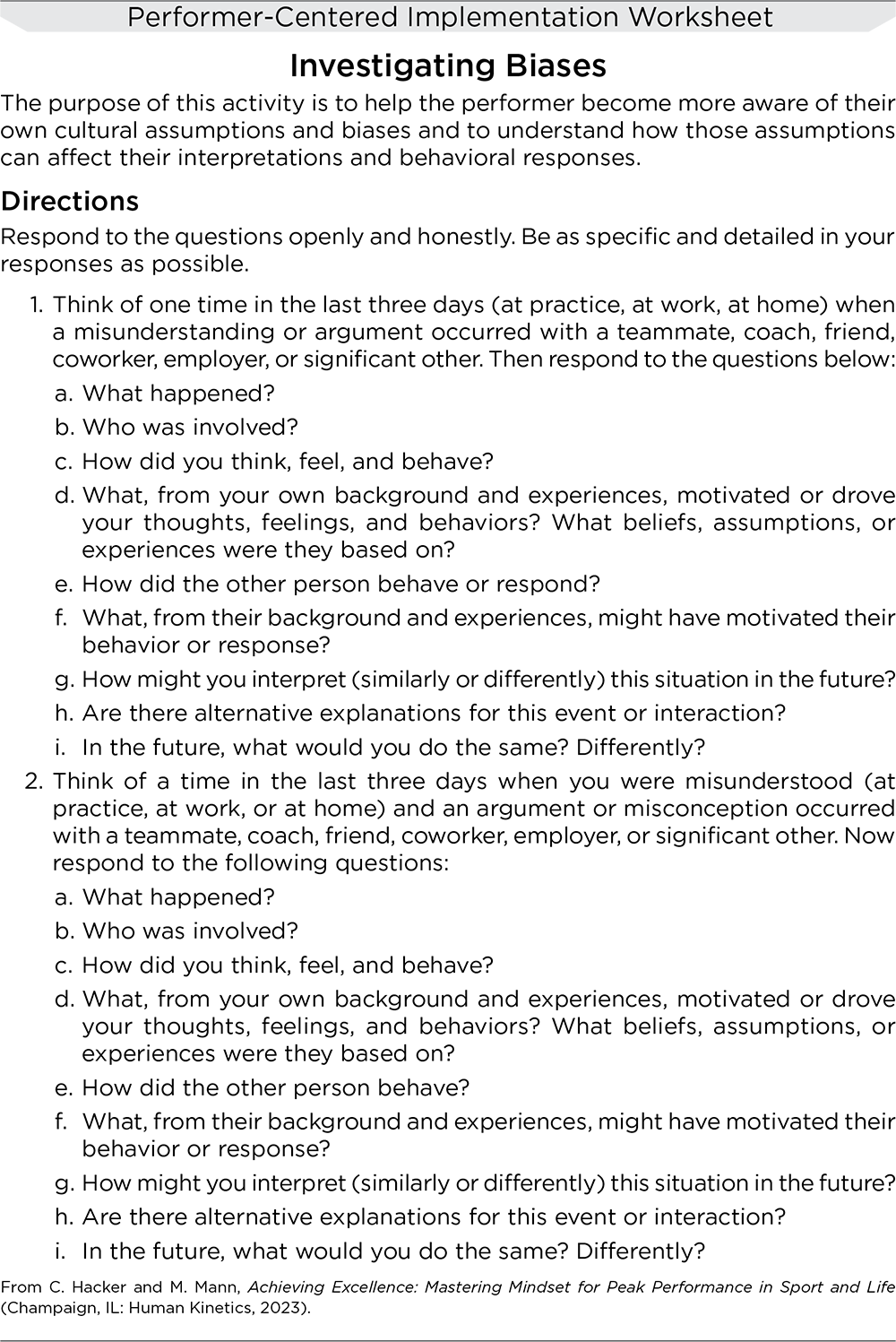Developing Inclusive Excellence in Performance Domains
This is an excerpt from Achieving Excellence by Colleen M Hacker,Mallory E Mann.
Often, people claim to value diversity and understand its importance, yet fail to behave in ways that demonstrate their beliefs and commitments. Physical educators and coaches, for instance, “value diversity but struggle to implement culturally responsive pedagogy” or teaching strategies (Columna et al. 2010). It is in trying and struggling and getting it wrong and committing to doing better next time that we ultimately move toward more inclusive performance spaces. In this section, we offer strategies for achieving inclusive excellence. This list will not be exhaustive but will provide ideas for challenging your thoughts and biases and behaviors.
Cultivating Cultural Competence
Denying or ignoring culture in physical activity and sport contexts can result in decreased participation, alienation and distress, and reduced physical performance (Blodgett et al. 2011; McGannon and Schinke 2013). On the other hand, learning about the barriers and challenges that Tatyana McFadden faced on her journey to 17 Paralympic medals or how Perdita Felicien became an Olympic hurdler for Team Canada after growing up in poverty could help create a more inclusive performance environment for everyone. It is impossible to understand performers’ psychological states and behaviors without becoming aware of the social and cultural context in which they live and work and perform.
Whether you are a teammate, a boss, or a coach, developing knowledge not only of the performance domain but also of your own identity-based experiences and those of your employees, teammates, and coworkers is imperative. In addition, working to grasp how those experiences affect each group member’s interpretations and behavioral responses is critical.
Develop Cultural Awareness
The first step in this process is to become culturally aware that each member of your team holds multiple intersecting identities and that each of those identities has shaped their experience, their values, and their beliefs. For example, an article written by Hacker and Mann (2017) described a mental skills coach working with a national team from a cultural background different from hers, and the expectation for timeliness became a point of concern. The mental skills coach expected the team to arrive for practice at the exact start time, but this team was late. Only through reflection and developing cultural awareness was the sport psychology consultant able to recognize that her expectation of time stemmed from her experiences living in a time-based culture, whereas the athletes lived and performed in an event-based culture that taught them time was secondary to the experience of togetherness and that one event did not end until everyone agreed to move to the next event. A culturally blind approach, where all people were treated the same regardless of their background, might have led this consultant to punish the group or to be upset with the members of the team and thus silence the athletes (Schinke et al. 2012). It is important for each performer to develop cultural awareness in order to better understand themselves and their teammates. Use the worksheet on page 297 to practice cultivating awareness of yourself and others.
Develop Cultural Competence
The second step in this process is to develop cultural competence and an understanding of how diversity can affect interpersonal dynamics. As stated earlier, the UEFA study (Ingersoll, Malesky, and Saiegh 2014) found that athletic teams composed of players from various regions in the world experience performance benefits. However, without careful and intentional demonstration of cultural competence over time, these differences and this diversity among athletes can be detrimental to communication and to performance. One such example comes from a team playing in the National Women’s Soccer League, a professional league in the United States (Hacker and Mann 2017). On this team, women from Asia, South America, and North America all competed together; however, several of these athletes were performing in their second, or even third, spoken language. As a result, their teammates who were native English speakers were becoming frustrated with the delay in processing verbal commands and responses on the field. Although coaches had encouraged athletes to be patient with one another and to be aware of the player’s circumstances, tension was mounting early in the season. A culturally competent approach to this problem included putting each team member in an alternative competitive situation (unrelated to soccer) and requiring them to perform by learning words in a language system with which they were unfamiliar (Hacker and Mann 2017). As a result, each athlete felt and developed empathy for what it must be like for their peers and teammates to perform under competitive pressures and demands while communicating in a second or third language. This example demonstrates the importance of cultural competence in sport settings. When preparing for a business meeting across the world, a culturally competent executive would study the nonverbal forms of expression that signal respect or demonstrate agreement or displeasure. Doing so could provide the critical difference between closing a deal or failing to sign on for a project that the company was providing.

SHOP

Get the latest insights with regular newsletters, plus periodic product information and special insider offers.
JOIN NOW
Latest Posts
- How do I integrate nutrition education into PE?
- How does the support of friends and family influence physical activity?
- What makes the Physical Best approach unique?
- Strength training gimmicks . . . or not?
- How do vitamins and minerals support our bodies?
- Why do many people have difficulty losing weight?


